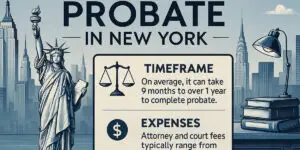You cannot leave money or other kinds of property to your pet. The law says animals are property, and one piece of property cannot own another piece of property. However, you can plan to make sure that your pet has a good life after you die. Use your estate plan to make sure that
- Your pet goes to a caring person or organization, and
- The new caretaker has the resources to take good care of him or her.
Options for Estate Planning for Pets
When planning for your pet’s life after your death, you have a range of options – from making simple, non-legal arrangement, to making a complex trust, to leaving your pet with an organization dedicated to taking care of pets after an owner’s death.
To make any of these arrangements, you need to find a person or organization that you trust to care for your pet. And that person or organization needs to be willing to do it. So no matter which option you choose, have a candid conversation with your pet’s potential caretaker about how to care for your pet and how expenses will be met.
Pets in Your Will
Again, you cannot use your will to leave money or property to your pet. If you try, that money or property will be included in your residuary estate. However, you can use your will or living trust to leave your pet and money to care for your pet to a trusted caretaker.
Pet care
Have you thought about what would happen to your pet in the event of your death or incapacity? Approximately two-thirds of American households own a pet, and while we have many people in our busy lives, our pets have only us. Pet owners often lament that beloved animal companions don’t live as long as we do, but they still warrant consideration in our estate plans because we don’t know what the future will bring. This is especially true for animals with longer life expectancies or higher costs of care, such as dogs, cats, horses, parrots, turtles and animals with special needs. Without provisions for your pet in your living trust, in the short term your pet could go days at home without food and water, and could feel panicked, distressed or abandoned. In the long term, your pet could end up with someone you don’t want them to end up with, or at a shelter where he or she could be euthanized. Contrary to popular belief, informal arrangements are generally not legally enforceable and simply adding your pet to your will often isn’t enough. Your pet will need care long before your will is probated, and wills offer no ongoing control or oversight for your pet, the caregiver or funds left for your pet.
Including the following documents in your estate plan can help to ensure that someone has access to your home and authorization to care for your pets in the short term, and can ensure that you decide who will ultimately care for your pets, and how they will be cared for, if you die or become incapacitated.
Pet Trust
A pet trust is a great way to ensure that your pet is cared and provided for after your death. The pet trust may be a part of your existing trust or may be a completely separate trust. It allows you to name the caretaker of your pets and creates a fiduciary obligation on the named caretaker to care for your pet in the manner described in your trust. You will provide money for your pet to be cared for, and the trustee of the trust will disburse funds to the caretaker or directly to a service provider to pay for your pet’s care. The trustee is similarly under a fiduciary obligation to ensure that the trust funds are used only for the purposes described by your pet trust.
A pet trust also allows you to name successive caretakers in case your preferred caretaker becomes unable or unwilling to take care of your pet, for example, if he or she has a change in life circumstances (e.g. medical concerns or new family obligations, among other reasons). Without a pet trust, on the other hand, your pet becomes the legal property of the person who assumes care of the pet, and the new owner may make decisions about the pet’s future that you might disagree with. If the new owner doesn’t make any formal arrangements, your pet’s future could be in limbo if something happens to the new owner. If you want to maintain control over the succession of caregivers for your pet, a pet trust drafted by an experienced estate planning attorney is crucial and affords the best long term protection for your pet.
Durable Power of Attorney for Pet Care
The Durable Power of Attorney for Pet Care allows you to authorize someone else to seek medical care for your pet and specify to what extent the agent may act on your behalf. This document can also be used by a pet caretaker while you are away on business or vacation. Alternatively, if your own Durable Power of Attorney is “effective immediately” rather than “effective upon incapacity” (sometimes called “springing”), provisions for your pet may instead be added to your own Durable Power of Attorney.
Get help
If you would like to learn more about estate planning, any of our estate planning attorneys would be happy to assist you.









